Bitwarden Pricing
Bitwarden is free and open-source software, but unlike community-developed alternatives such as KeePass, it is a commercial venture.
The core product is free and will stay free forever, but you can support the developer by paying a very reasonable $10 per year subscription fee for a premium personal account. Premium users enjoy some cool (non-core) additional features, as outlined below.
In addition to a premium personal plan, Bitwarden offers family plans and a couple of enterprise plans aimed at businesses.
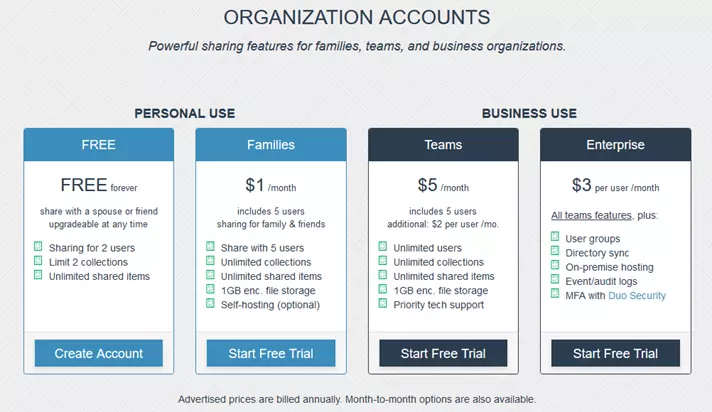
In this review, we will focus on personal plans.
What features does Bitwarden offer?
The following features are available to free users:
- End-to-end encryption (e2ee) of passwords
- 100% open source
- Cross-platform apps for all major platforms
- Browser add-ons for all major browsers
- Web browser access from anywhere
- Command-line tools (CLI) to write and execute scripts on your Bitwarden vault
- Can self-host
- Two-factor authentication (2FA)
Paying $10 a year adds:
- 1GB encrypted file storage
- Additional 2FA options
- Priority customer support
What is important to note is that there is no account recovery feature.
How easy is Bitwarden to use?
To start using Bitwarden, just download the app for your platform and sign-up in-app. A password is requested, but this is not verified. You’ll need to think of a strong master password, and can choose a hint to help you remember it.
And that’s it! Just don’t forget your master password!
The desktop clients
The Bitwarden desktop clients are basically identical in Windows, macOS, and Linux. Most versions of Linux are supported thanks to the app being packaged in the AppImage format. It is also available through the Ubuntu Software Center and, of course, you can compile the open-source code yourself.
We find the interface to be smart looking and very easy to use. Four “Types” of data entry are supported: login, card, identity, and secure note.
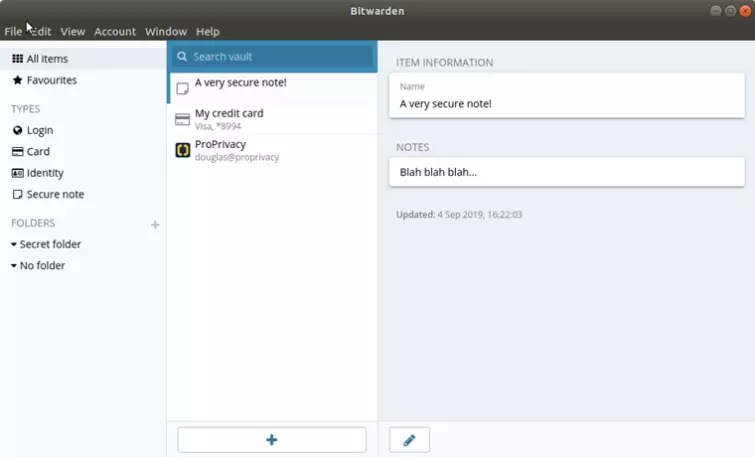
Each entry Type is formatted in a way suitable to entering data of that kind, and which the app can use to auto-fill passwords, web forms, and card detail forms. using browser add-ons.
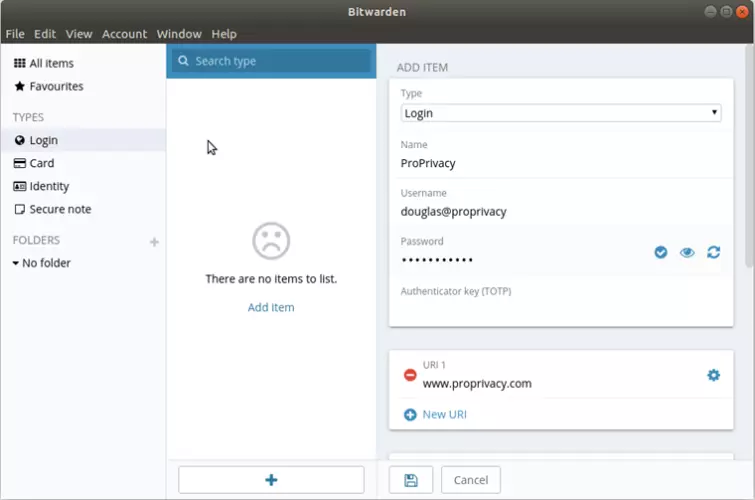
An interesting new feature is a button in the password field which checks if the password you input has been exposed. This works much like our very own data breach tool and compares the username and password you enter with a database of known password breaches.
A more secure option than thinking up your own all-too-fallible passwords is to let the Bitwarden app generate secure passwords for you. These passwords can be tailored to conform with any specific requirements a website insists on.
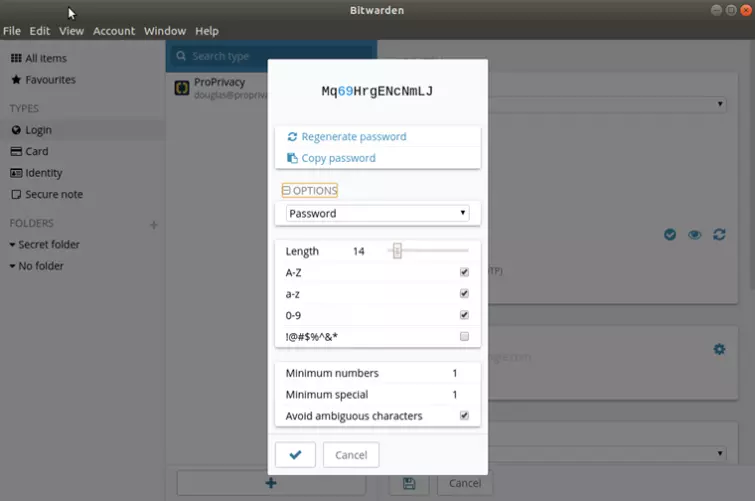
You can also create folders and add items to them. What more do you want? If you need group password management and sharing features then these are provided by Bitwarden’s organization accounts.
Autofill functionality on the desktop is provided by browser add-ons for Firefox and Chrome.
The Mobile Apps
The mobile Android and iOS apps are very similar, and share the same attractive and intuitive design philosophy as their desktop siblings.
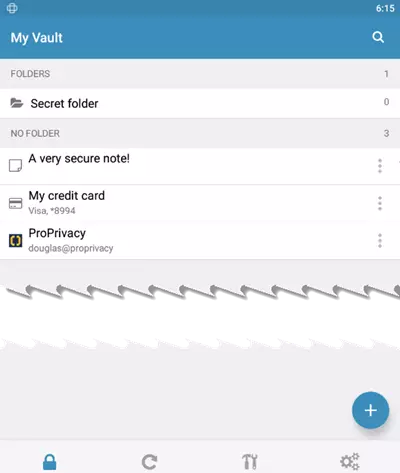
Both apps do everything their desktop siblings can including generate secure random passwords. They also both support fingerprint unlocking on devices which have fingerprint sensors.
The Androids app uses the Autofill Framework Service on Android 8+ devices and the Auto-fill Accessibility Service on older Android devices to auto-fill forms in any browser window or app. In addition to this, the browser add-ons work with the mobile versions of Firefox and Chrome.
In iOS 12+ the Bitwarden app integrates with Apple’s new Authentication Services framework to provide instant autofill functionality in most browsers and apps.
Web Vault
In addition to using apps, it is possible to access your passwords via the “Web Vault” from any browser. This is handy, although the possibility of compromised servers pushing malicious JavaScript code directly to your browser window means that using browser-based e2ee cryptography will never be quite as secure as performing the cryptography in a stand-alone client.
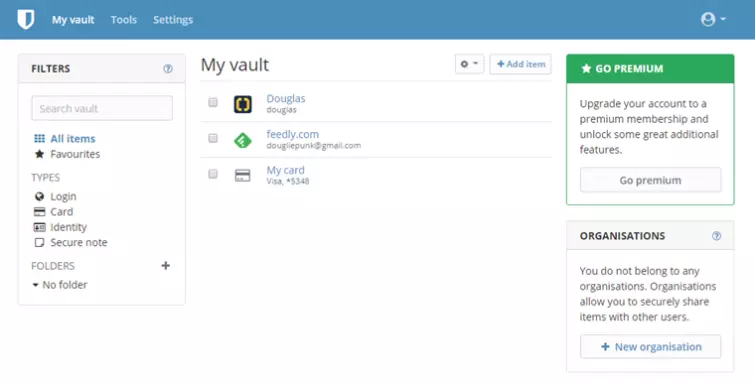
Interestingly, the only way to import data is via the Web Vault, which accepts files exported from a huge range of password managers
Command-line interface CLI
In addition to graphical user interfaces (GUIs) for all major platforms, Bitwarden provides a powerful CLI client for Windows, macOS, and Linux.
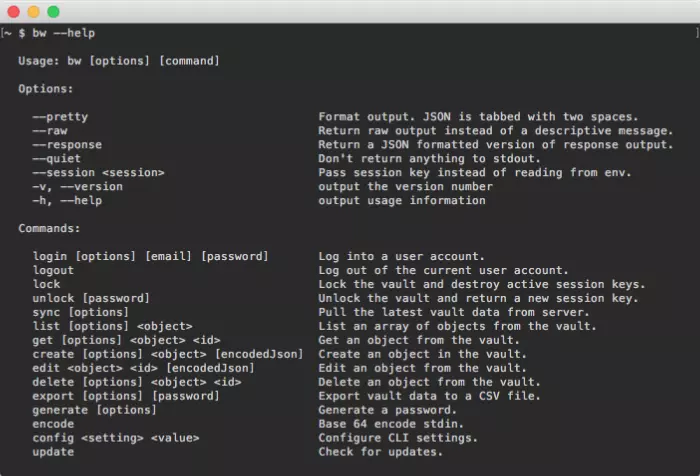
It doesn’t really do anything the GUI clients don’t, but it is very lightweight and geeks will love it!
Browser add-ons
Browser add-ons are available Chrome, Firefox, Vivaldi, Opera, Brave, and Microsoft Edge. A Firefox link is provided for the Tor Browser, but we do not recommend this as using any browser add-on with Tor Browser makes it more susceptible to browser fingerprinting.
The add-ons look like the Bitwarden apps and provide the same core functionally.
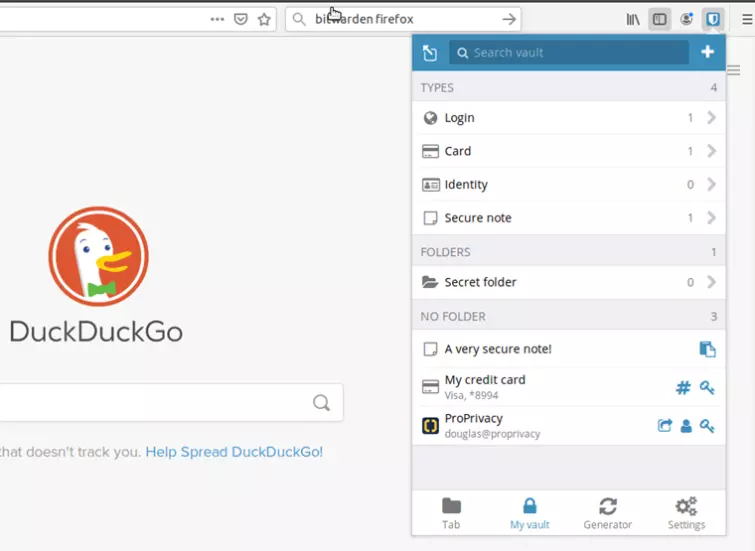
They also make auto-filling logins, forms, and suchlike a breeze.

Bitwarden customer support
An extensive help section provides detailed documentation on most aspects of Bitwarden. If you have any additional questions you can email them in.
Bitwarden is basically a one-man show, so all responses we received were from its developer Kyle Spearrin himself. Responses typically arrived on the same day. Alternatively, the Bitwarden website hosts an active forum on which Kyle is an enthusiast participant.
Privacy and security
Bitwarden is a US company and is therefore subject to FISA, the Patriot Act, and very likely surveillance by the NSA. Which shouldn’t matter because…
Bitwarden uses fully audited open-source end-to-end encryption (e2ee). Which is as good a guarantee that it is secure and private as it’s possible to get. The only way to decrypt your data is by using the correct master password, which is not recoverable should you forget it. So don’t.
Because e2ee is used, it shouldn’t matter that Bitwarden uses Microsoft Azure cloud servers to host accounts, although if this really bugs you then you can self-host on a home or rented server of your choice using the open-source Docker framework.
Audit
In November 2018 a crowdfunded independent security audit by Cure53 found no major issues with the software. Some non-critical issues were discovered, the most important of which were patched immediately. We can only presume that developer Kyle has been working hard this last year to fix any additional issues raised by the audit.
Technical security
Data at rest is protected using an AES-256 cipher. PBKDF2 is used to derive the encryption key from your master password, which is then salted and hashed using HMAC SHA256. These are all respected third-party cryptographic libraries.
Data in transit is protected by regular TLS - which is fine. Even if your data was somehow intercepted in transit (via a MitM attack using fake SSL certificates) it could not be accessed because it is encrypted with AES-256 before leaving your device.
In 2018 a flaw was found in the Chrome add-on’s cryptography. This was largely fixed immediately, although you should never use the ‘never forget’ option of Bitwarden if you do not want your encryption key to exist on disk.
Two-factor authentication (2FA)
Free users can secure their Bitwarden Vaults using a Time-based One-Time Password (TOTP) or email verification for two-factor authentication. Premium users can also use 2FA methods such as Duo, YubiKeys, and other FIDO U2F-compatible USB or NFC devices.
Check out our "what is 2FA" page if you are new to this.
Final thoughts
Bitwarden is a free and open-source password manager that can go head-to-head with any of its closed- source subscription-based rivals. It is powerful, looks good, is intuitive to use, and syncs seamlessly across all your devices.
In our view, Bitwarden’s only real rival is the similarly open-source KeePass and its various forks. Bitwarden looks prettier than KeePass and is easier to set up and use, but thanks to the huge number of add-ons available to KeePass, it is no-where near as powerful or flexible.
KeePass is also true community-developed software rather than a one-man for-profit product (albeit one which is open-source). Bottom line: Bitwarden is the ideal password manager for the less technically minded.
0 User Reviews
Leave a Review
Thanks for your review!
17 Comments
Write Your Own Comment
Your comment has been sent to the queue. It will appear shortly.

Baivab Kumar
John Smith
Douglas Crawford replied to John Smith
George replied to Douglas Crawford
Ray Walsh replied to George
Bluesbirdy
Douglas Crawford replied to Bluesbirdy
zylstra replied to Douglas Crawford
Douglas Crawford replied to zylstra
Neil
Douglas Crawford replied to Neil